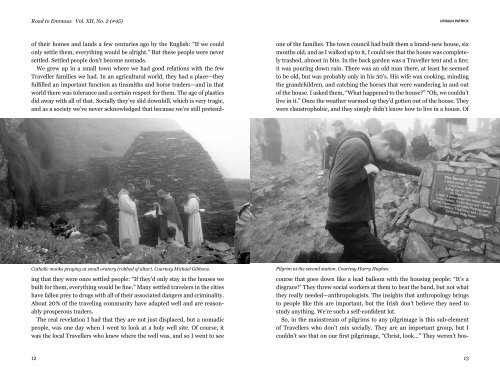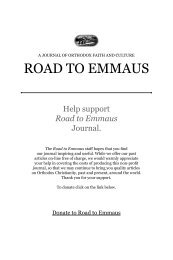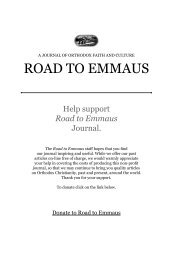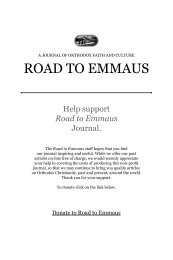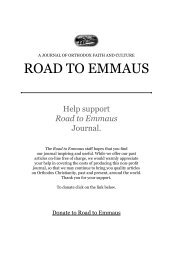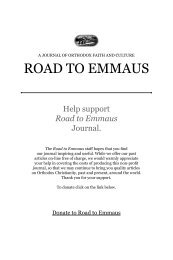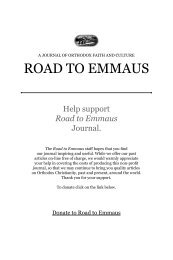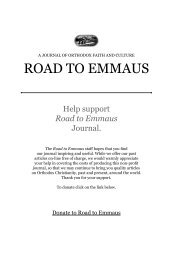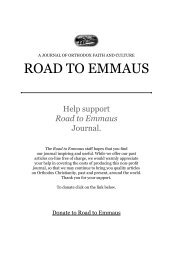RTE No 20 Interior - Road to Emmaus Journal
RTE No 20 Interior - Road to Emmaus Journal
RTE No 20 Interior - Road to Emmaus Journal
You also want an ePaper? Increase the reach of your titles
YUMPU automatically turns print PDFs into web optimized ePapers that Google loves.
<strong>Road</strong> <strong>to</strong> <strong>Emmaus</strong> Vol. XII, <strong>No</strong>. 2 (#45)CROAGH PATRICKone of the families. The <strong>to</strong>wn council had built them a brand-new house, sixmonths old, and as I walked up <strong>to</strong> it, I could see that the house was completelytrashed, almost in bits. In the back garden was a Traveller tent and a fire;it was pouring down rain. There was an old man there, at least he seemed<strong>to</strong> be old, but was probably only in his 50’s. His wife was cooking, mindingthe grandchildren, and catching the horses that were wandering in and ou<strong>to</strong>f the house. I asked them, “What happened <strong>to</strong> the house?” “Oh, we couldn’tlive in it.” Once the weather warmed up they’d gotten out of the house. Theywere claustrophobic, and they simply didn’t know how <strong>to</strong> live in a house. OfCatholic monks praying at small ora<strong>to</strong>ry (robbed of altar). Courtesy Michael Gibbons.course that goes down like a lead balloon with the housing people: “It’s adisgrace!” They threw social workers at them <strong>to</strong> beat the band, but not whatthey really needed—anthropologists. The insights that anthropology brings<strong>to</strong> people like this are important, but the Irish don’t believe they need <strong>to</strong>study anything. We’re such a self-confident lot.So, in the mainstream of pilgrims <strong>to</strong> any pilgrimage is this sub-elemen<strong>to</strong>f Travellers who don’t mix socially. They are an important group, but Icouldn’t see that on our first pilgrimage, “Christ, look…” They weren’t hosoftheir homes and lands a few centuries ago by the English: “If we couldonly settle them, everything would be alright.” But these people were neversettled. Settled people don’t become nomads.We grew up in a small <strong>to</strong>wn where we had good relations with the fewTraveller families we had. In an agricultural world, they had a place—theyfulfilled an important function as tinsmiths and horse traders—and in thatworld there was <strong>to</strong>lerance and a certain respect for them. The age of plasticsdid away with all of that. Socially they’ve slid downhill, which is very tragic,and as a society we’ve never acknowledged that because we’re still pretendingthat they were once settled people: “If they’d only stay in the houses webuilt for them, everything would be fine.” Many settled travelers in the citieshave fallen prey <strong>to</strong> drugs with all of their associated dangers and criminality.About <strong>20</strong>% of the traveling community have adapted well and are reasonablyprosperous traders.The real revelation I had that they are not just displaced, but a nomadicpeople, was one day when I went <strong>to</strong> look at a holy well site. Of course, itwas the local Travellers who knew where the well was, and so I went <strong>to</strong> seePilgrim at the second station. Courtesy Harry Hughes.1213


